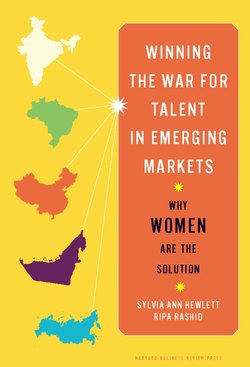Читать книгу Winning the War for Talent in Emerging Markets - Sylvia Ann Hewlett - Страница 6
На сайте Литреса книга снята с продажи.
AN INTRICATE WEB OF PUSHES AND PULLS
ОглавлениеDeeply entrenched stereotypes make it difficult for Western employers to have a clear view of this new tranche of talent. But behind the images—the cliches of the girl from Ipanema with the world's smallest string bikini, the doe-eyed Bollywood heroine, and the docile Asian wife who collects Ferragamo shoes and Chanel jackets by the closetful—is a generation of well-educated women determined to forge a new identity. Thanks to the Internet, movies, and TV, their role models are drawn not from traditional cultural archetypes or national heroines but from around the world. They have a global perspective, a view that includes their role in helping their country develop its new identity.
Even though the potent pool of highly qualified women professionals in emerging markets is composed of neither victims of oppression nor cultural caricatures, organizations should not make the other mistake of assuming that these women are BRIC clones of their counterparts in advanced industrialized economies. In fact, their career dynamics—both the opportunities they aspire to and the challenges they encounter—are complex, fundamentally different, and, says Subha Barry, former global head of diversity at Merrill Lynch, “so nuanced that it's easy to miss the multitude of issues these women are dealing with.”
Among them are these challenges:
The maternal guilt that frequently derails Western women's careers is less onerous among female professionals in the BRICs and the United Arab Emirates (UAE), but they carry a heavy load of “daughterly guilt.” In countries like India, China, and the UAE, where notions of filial piety underpin cultural values and where demographers project an explosion in the percentage of the population over the age of sixty, elder care responsibilities are a ticking time bomb.
Although “extreme jobs”—characterized by extended work weeks, an always-on 24/7 culture, and intense performance pressure—are the norm among highly qualified and ambitious women worldwide, the average workweek for employees of multinational corporations (MNCs) in BRIC nations is especially onerous. Moreover, the demands of work have intensified over the past few years; more than a quarter of the women surveyed by the CWLP report working, on average, eight to eighteen hours more per week than three years ago, additional time that amounts to one to two extra workdays.
Workplace biases faced by professional women in these markets are overt and explicit. At least 40 percent of the women surveyed in Brazil, India, and China have encountered prejudice severe enough to make them consider scaling back their career goals or quitting altogether.
Biases in the workplace are magnified outside. In many emerging market countries, there is such strong social disapproval of—and occasionally outright danger for—women traveling alone that women often avoid industry sectors that require significant travel, such as pharmaceutical sales, and gravitate toward those based in urban, modern environs.
If we do not closely examine and understand the intricate web of pushes and pulls that can downsize ambition and stall promising careers, the full potential of this rich talent pool will remain untapped.
